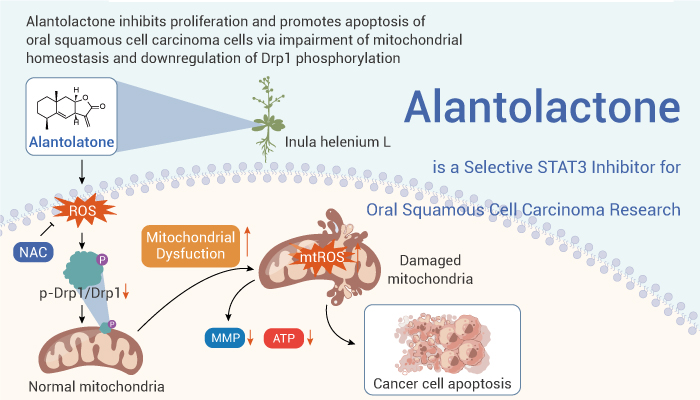Oral squamous cell carcinoma (OSCC) is one of the most prevalent and fatal oral cancers. Mitochondria-targeting therapies represent promising strategies against various cancers. Alantolactone (ALT) possesses anticancer properties and also regulates mitochondrial events. In a study, researchers explored the effects of ALT on OSCC and the related mechanisms.
Alantolactone exerted anti-proliferative and pro-apoptosis effects on OSCC cells
Alantolactone (ALT) inhibited proliferation and promoted apoptosis of oral squamous cell carcinoma cells via impairment of mitochondrial homeostasis and regulation of Drp1. Mechanistically, ALT elicited cell injury by promoting ROS production, mitochondrial membrane depolarization, and ATP depletion, which were reversed by NAC. Bioinformatics analysis showed that Drp1 played a crucial role in OSCC progression. OSCC patients with low Drp1 expression had a higher survival rate. The OSCC cancer tissues presented higher phosphorylated-Drp1 and Drp1 levels than the normal tissues. The results further showed that ALT suppressed Drp1 phosphorylation in OSCC cells. Moreover, Drp1 overexpression abolished the reduced Drp1 phosphorylation by ALT and promoted the cell viability of ALT-treated cells. Drp1 overexpression also reversed the mitochondrial dysfunction induced by ALT, with decreased ROS production, and increased mitochondrial membrane potential and ATP level.
In other studies:
Alantolactone induces apoptosis in HepG2 cells in a dose-dependent manner. Firstly, Alantolactone-induced apoptosis is associated with GSH depletion, inhibition of STAT3 activation, ROS generation, and increased Bax/Bcl-2 ratio and caspase-3 activation. Secondly, Alantolactone decreases STAT3 translocation to the nucleus, its DNA-binding, and STAT3 target gene expression. Meanwhile, Alantolactone induces activin/SMAD3 signaling in human colon adenocarcinoma HCT-8 cells.It performs its antitumor effect by interrupting the interaction between Cripto-1 and the activin receptor type IIA in the activin signaling pathway.
In Vivo: The average tumor volume and average tumor weight in the Alantolactone-treated mice is lower compared with that in the control mice. However the administration of Alantolactone does not affect the overall bodyweight during the experimental period, suggesting no apparent toxicity. What’s more, the administration of Alantolactone results in a significant decrease in p-STAT3 and cyclin D1 expression in the tumor tissues.
In conclusion, Alantolactone is a selective STAT3 inhibitor, with potent anticancer activity. Alantolactone induces apoptosis in cancer.
Reference:
[1] Zhang Y, et al. J Transl Med. 2023 May 18;21(1):328.
[2] Khan M, et al. Biomed Res Int. 2013;2013:719858.
[3] Chun J, Cancer Lett. 2015 Feb 1;357(1):393-403.
